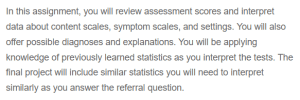Module Four Worksheet – Analyzing and Interpreting Assessment Data
Physical Symptoms: 75
DSM-5 Symptoms Scales
Attention-Deficit/Hyperactivity Inattentive: 90
Attention-Deficit/Hyperactivity Impulsive: 55
Conduct Disorder: 30
Oppositional Defiant Disorder: 40
Major Depressive Episode: 79
Manic Episode: 40
Generalized Anxiety Disorder: 60
Separation Anxiety: 40
Social Anxiety: 58
Obsessive Compulsive Disorder: 20
Autism Spectrum Disorder: 8
Setting Where Symptoms Are Reported
Home: Not True
Academic: Very True
Social: Pretty Much True
Follow-Up Questions
To complete this worksheet, replace the bracketed text with the relevant responses.
Which content scales are considered very elevated?
The content scales that are considered very elevated, as per the Connor scale include emotional distress, upsetting thoughts, academic difficulties, language, math, social problems, physical symptoms, attention deficit hyperactivity inattentive, and major depressive disorder (Cohen et al., 2022).
Which content scales are considered clinically significant but not very elevated?
The content scales that are considered to be clinically significant include social anxiety disorder, perfectionistic/compulsive Behaviors, violence Potential, and attention-Deficit/hyperactivity impulsive.
In which settings do these symptoms appear to occur?
These symptoms appear to occur in the social and academic settings but are predominant in the social setting.
Using the very elevated interpretation, what are some possible diagnoses for this individual?
The scale revealed that emotional distress, upsetting thoughts, academic difficulties, language, math and social problems, and physical symptoms are some of the very elevated content areas. Possible diagnoses identified by the tool are Attention Deficit Hyperactivity Disorder (ADHD) of predominantly inattentive type and major depressive disorder. Several manifestations captured in the content scale are normative findings in ADHD of inattentive type. Cabral et al. (2020) note that patients with ADHD will have learning difficulties and present with problems in language and math. The patients in the case presented had academic difficulties, language and math problems, and emotional distress. This supported the ADHD diagnosis as elucidated by the tool. The presence of upsetting thoughts is suggestive of major depressive disorder.
Based on this very limited data, what are two contextual factors that might offer plausible explanations for why this individual is having such a difficult year?
The individual in the case is having a difficult year. While these may be suggestive of an underlying mental health illness, they may also be a result of a negative parenting style and family conflict. A negative parenting style in the form of physical and emotional abuse and neglect may have unwanted effects on the child. Children who are abused by their parents are more likely to perform poorly in school and develop some form of disability (Hameeda Narejo et al., 2023). Family conflicts, such as between parents, are also likely to have unwanted effects on the child. Children from highly conflicted families are likely to develop emotional, behavioral, and social problems (Zhao et al., 2023). This may have been the case in the child case above.
References
Cabral, M. D., Liu, S., & Soares, N. (2020). Attention-deficit/hyperactivity disorder: Diagnostic criteria, Epidemiology, risk factors and evaluation in Youth. Translational Pediatrics, 9(S1). https://doi.org/10.21037/tp.2019.09.08
Cohen, R. J., Schneider, W. J., & Tobin, R. M. (2022). Psychological testing and assessment:
An introduction to tests and measurement. McGraw Hill.
Hameeda Narejo, Aijaz Ali Wassan, & Eurm Shah. (2023). The impact of parental conflict on children for their growth, upbringing, and proper grooming. Progressive Research Journal of Arts & Humanities (PRJAH), 5(2), 55–68. https://doi.org/10.51872/prjah.vol5.iss2.277
Zhao, J., Zhao, H., & Zhou, A. (2023). Negative parenting styles and psychological crisis in adolescents: Testing a moderated mediating model of school connectedness and self-esteem. Behavioral Sciences, 13(11), 929. https://doi.org/10.3390/bs13110929
ORDER A PLAGIARISM-FREE PAPER HERE
We’ll write everything from scratch
Question 
In this assignment, you will review assessment scores and interpret data about content scales, symptom scales, and settings. You will also offer possible diagnoses and explanations.

Module Four Worksheet – Analyzing and Interpreting Assessment Data
You will be applying knowledge of previously learned statistics as you interpret the tests. The final project will include similar statistics you will need to interpret similarly as you answer the referral question.